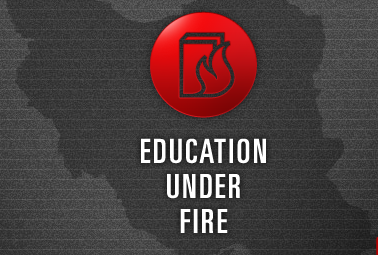 Last week, I had the honour of speaking on a panel at the Toronto screening of Education Under Fire, a film about the exclusion of Bahá’ís from Iranian universities and colleges and the crackdown on the Bahá’í Institute for Higher Education (BIHE). The evening was a perfect opportunity to offer support for this important documentary campaign sponsored by Amnesty International but also to share the Sentinel Project’s own perspective on anti-Bahá’í persecution and what it means. As you will know if you follow our updates, Bahá’ís in Iran face much more than just exclusion from education since they are also frequently the targets of arbitrary arrest and imprisonment, exclusion from the economy, and dehumanizing attacks in the media. Overall, this adds up to a campaign which closely matches the genocidal process that we’ve seen time and again. The denial of education is only one (albeit very important) aspect of gradually weakening and destroying a community.
Last week, I had the honour of speaking on a panel at the Toronto screening of Education Under Fire, a film about the exclusion of Bahá’ís from Iranian universities and colleges and the crackdown on the Bahá’í Institute for Higher Education (BIHE). The evening was a perfect opportunity to offer support for this important documentary campaign sponsored by Amnesty International but also to share the Sentinel Project’s own perspective on anti-Bahá’í persecution and what it means. As you will know if you follow our updates, Bahá’ís in Iran face much more than just exclusion from education since they are also frequently the targets of arbitrary arrest and imprisonment, exclusion from the economy, and dehumanizing attacks in the media. Overall, this adds up to a campaign which closely matches the genocidal process that we’ve seen time and again. The denial of education is only one (albeit very important) aspect of gradually weakening and destroying a community.
With me on stage were Shahram Negari, a former student of the BIHE, Shahrzad Mojab, a professor of education, and Gerald Filson from the Bahá’í Community of Canada. Together, we fielded several insightful questions and comments from the audience but overall a common theme throughout the discussion was the question of how to help Bahá’ís in Iran. Personally, I argue that there should be three aspects to any campaign aiming to prevent genocide in Iran:
- Raising the profile of anti-Bahá’í persecution – Anyone who knows me knows that I’m definitely not a fan of awareness raising for the sake of awareness raising. This sort of public education should only be the first step which prepares the ground for later action. In this case, it can have a positive effect if used to ensure that Bahá’í rights – and in fact all human rights – in Iran come into consideration when the international community is dealing with higher-profile issues such as nuclear proliferation.
- Help Bahá’ís continue communal self-help programs such as BIHE – Services like education are essential for the development and survival of any community. One great way to support the Bahá’í community in Iran is to identify initiatives like BIHE or even other needs that aren’t being met and provide whatever assistance they need.
- Prepare the Bahá’í community for increased persecution – This may be unpleasant to consider but it is absolutely essential to help any community at risk of genocide prepare for the day when their situation may get much, much worse. We have already seen an escalation in abuses over the past year and the fact is that the more we prepare now, the more lives we can save if the worst case scenario unfolds. If there is one thing that I’ve learned from studying disaster management, it’s that as much as you may hope to prevent a destructive event, preparation to mitigate the damage if it does happen is absolutely essential.
Films like Education Under Fire are extremely important for showing people what is happening in potentially genocidal situations like that in Iran. I sincerely hope that we can participate in more of them in the future. What I really want though is to ensure that we don’t stop after watching a film or having a discussion. Awareness is just the first step when it comes to genocide prevention. Everything that comes after that needs to be concrete, goal-oriented action.
